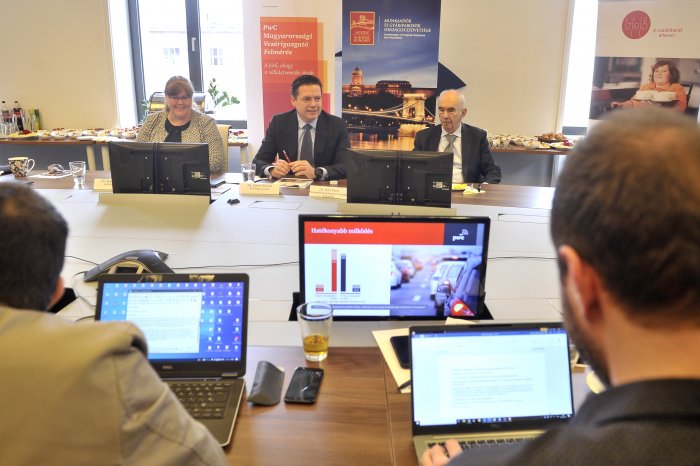Hungarian CEOs expect a slowdown in 2020, PwC says

Photo by Attila Kovács
While Hungarian CEOs are confident about their own companyʼs growth prospects, most of them expect a slowdown in both Hungarian and global economic growth this year, according to Big Four company PwCʼs latest Hungarian CEO survey.
Photo by Attila Kovács
This is the ninth year that PwC Hungary has gauged the opinions of 223 Hungarian CEOs in cooperation with the Confederation of Hungarian Employers and Industrialists (MGYOSZ). The majority of the surveyed business leaders now expect a slowdown in the rate of global (66%) and Hungarian (60%) economic growth, which is their gloomiest prediction yet. Similarly to previous years, CEOs expect the rate of slowdown for Hungary to be more subdued over the next 12 months.
Still, some 81% of the respondents are confident about their companies’ financial prospects for both the next 12 months and the next three years.
The most popular method for driving revenue growth among Hungarian CEOs is improving operational efficiencies, with 81% of the respondents planning to do so in 2020. Some 60% say they are planning to launch a new product or service, while 53% are counting on organic growth. PwC says that acquisitions feature less and less prominently in growth plans.
According to Tamás Lőcsei, PwC Hungary’s CEO, the results of this year’s survey show that Hungarian CEOs have a clear vision of how they can create value for their clients. This should explain why they remain confident about their own organizations’ outlook while predicting a slowdown in economic growth. This is also an encouraging sign for the long-term growth prospects of Hungarian companies.
Labor market still a major barrier to growth
Just like in the previous years, Hungarian business heads believe that skills shortages (88%) and changing workforce demographics (70%) are the main barriers to growth. Other top threats include exchange rate volatility (66%), rising employee benefits and pension costs (63%), and uncertain economic growth (58%). The number of CEOs naming uncertain economic growth as one of the most significant threats has grown significantly in the last few years. Overregulation also remained one of the top threats to organizations’ growth prospects.
"In fact, Hungarian CEOs have consistently ranked over-regulation among the top threats for several years," said Barbara Koncz, director at PwC Hungary’s Tax and Legal Services.
In this year’s survey, nearly two-thirds (64%) of CEOs say they consider over-regulation to be one of the key barriers to growth.
"Most of them are also concerned about increasing legislation around online content, compliance with data protection regulations, and industry-specific questions," she added.
When asked about which emerging technology areas are the most important for business and government to collaborate on, CEOs ranked cybersecurity and digital privacy as the two most important areas, followed in third place by artificial intelligence.
Importance of upskilling grows
According to the survey, most companies are still at the start of their upskilling journey, with 27% of respondents saying that they have defined the skills needed to drive their future growth strategy, and 23% planning to improve their employees’ and leaders’ knowledge of technology.
It has also emerged from this year’s survey that the CEOs of companies at the forefront of upskilling are more confident about the economic outlook. PwC also looked at the key challenges companies currently face in their upskilling efforts: the biggest challenges are to retain upskilled employees and motivate employees to apply their learning.
PwC says that both beginning and more advanced upskilling organizations are achieving higher workforce productivity, a stronger corporate culture, and improved talent retention as a result of their upskilling programs.
According to Péter Futó, president of the Confederation of Hungarian Employers and Industrialists: "Under the current labor market conditions, the biggest challenge is to find and retain employees who can be instrumental in implementing the company’s strategy. The key to corporate success is a workforce that is willing and able to learn.
"However, fostering a culture of learning and motivating employees to learn is not only the employer’s concern: the ability to develop also enhances the labor market value and position of employees. This ability is at least as important as existing knowledge, as skills should keep pace with changes in the company, market conditions, and the technological environment," Futó adds.
In the last edition of the survey, the number of CEOs citing climate change as a top threat doubled from the year before. This year, however, there is hardly any perceptible change.
Still, company heads are aware of the opportunities provided by going green. About two-thirds of CEOs say that investing in "green" initiatives provides a reputational advantage, and nearly half of them realize that going green will afford significant new product and service opportunities.
The entire survey is available here.
SUPPORT THE BUDAPEST BUSINESS JOURNAL
Producing journalism that is worthy of the name is a costly business. For 27 years, the publishers, editors and reporters of the Budapest Business Journal have striven to bring you business news that works, information that you can trust, that is factual, accurate and presented without fear or favor.
Newspaper organizations across the globe have struggled to find a business model that allows them to continue to excel, without compromising their ability to perform. Most recently, some have experimented with the idea of involving their most important stakeholders, their readers.
We would like to offer that same opportunity to our readers. We would like to invite you to help us deliver the quality business journalism you require. Hit our Support the BBJ button and you can choose the how much and how often you send us your contributions.





.jpg)




